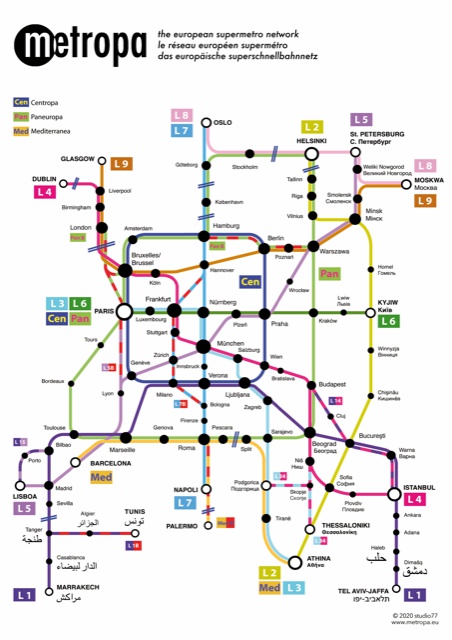Saturday, 5 th September 2020
Let’s make things complicated, even though they could be simple. This is Portugal at its best. Anyone who is crazy enough to travel by train from Lisbon to London – or from London to Lisbon – is in for a trip back in time as the journey takes a total of three days. Your holidays start on the train. I am afraid that, instead of a TGV, the Portuguese rail companies are now considering using donkeys – the ones that retired in 1945 – so that in 2020 they can offer customers a truly historic service. Carbon neutral: from Lisbon to London by donkey. Since someone decided to cancel the night train (Sud Expresso) to Lisbon, Portugal is no longer connected in this way to the rest of Europe. In other words: we are segregated. There is no longer an express train to Spain nor to France. And now? Are we going back to 1945? Did we go from using trains to donkeys?
Whether we like it or not, we only have one neighbouring country: Spain. And since Portugal does not (yet) have a TGV connection to Paris – there is no fast rail connection from Portugal to France – the traveller first has to take a regional train from Lisbon to the north to go east, to Entroncamento. This is our first 117 km and there are 27 connections a day. One could also travel by Évora, which is closer, but unfortunately the railway service there has no onward connections. To reach Entroncamento, the travel time is usually one hour and 26 minutes. Anyone who wants to take a train onwards to Badajoz has only one option. The only train leaving Entroncamento is at 10:24am; it travels 181 km via Abrantes and Portalegre to reach the Spanish border city of Badajoz at 2:14pm. Here, we change trains. We leave the Middle Ages behind. By the way: the direct trainline from Lisbon to Badajoz is only 226km. From Badajoz, we travel onwards to Mérida, an ancient Roman city with a small Colosseum. The RENFE train travels 60 km from Badajoz to Mérida, leaving at 2:30pm and taking 44 minutes. The fare is €4.30. We change trains once again, leaving at 3:20pm. Four hours, 50 minutes and €31.10 later, we arrive in Madrid. It is 8:10pm; we have entered the modern era. At 8:30pm we leave for Barcelona. We arrive at 11:40pm. Here, we look around for a place to spend the night … we continue onwards the next morning. From now on, our journey is a little bit easier. The French TGV leaves Barcelona at 8:10am for Paris, where it arrives at 2:49pm. We change stations. At Gare de Lyon, we take the metro – Line 4 – to Gare du Nord. This connection takes 45 minutes. Then the journey continues on the 3:55pm service to Brussels and the Eurostar reaches London St Pancras at 9:47pm. The French railway company SNCF claims that I am responsible for a 5kg carbon emission during the trip from Paris to London. Is this possible? Is my emission as small as stated? Speaking of carbon footprints, it’s been two years since CP offered emissions calculations on its website. The end of the war in Europe fits well with the Covid-19 crisis in 2020. The re-introduction of donkeys suits Portugal. When travelling by donkey, we don’t need to calculate our carbon emissions.
 Now for the return trip. I want to go from London to Paris via Brussels, and from there on to Lisbon. The train leaves London at 8.55am and arrives in Paris (Gare du Nord) at 11:27am. The connecting train leaves Paris at 11:49am for Madrid. We change once in Barcelona and arrive in Madrid at 11:14pm. We’ve now been on our way for 13 hours; I’ve travelled 1,745 km and changed trains twice. No harm done. The next morning, I leave Madrid at 10:15am for Mérida. I arrive at 3:18pm and change trains to Badajoz, leaving at 3:25pm and arriving at 4:05pm. At 4:24pm, I then board the regional train R 5500 to Portugal – via Entroncamento (6:14pm) to Lisbon – where I am happy to pull up at 8:12pm into Oriente station. In ten hours, I have travelled 695 km by train and changed trains three times. To the politicians who govern Portugal: I’ve been waiting for many years for a TGV connection between Lisbon, Paris, Brussels and London. It’s only 2,334 km by train and, if I get on the TGV at 7pm in Lisbon, I would be able to reach Paris by 4am, Brussels by 5am and London by 7am. We would travel at an average speed of 200 km / h, which is technically feasible. Even though these things can be complicated, how about simplifying them? For more information, see www.seat61.com.
Now for the return trip. I want to go from London to Paris via Brussels, and from there on to Lisbon. The train leaves London at 8.55am and arrives in Paris (Gare du Nord) at 11:27am. The connecting train leaves Paris at 11:49am for Madrid. We change once in Barcelona and arrive in Madrid at 11:14pm. We’ve now been on our way for 13 hours; I’ve travelled 1,745 km and changed trains twice. No harm done. The next morning, I leave Madrid at 10:15am for Mérida. I arrive at 3:18pm and change trains to Badajoz, leaving at 3:25pm and arriving at 4:05pm. At 4:24pm, I then board the regional train R 5500 to Portugal – via Entroncamento (6:14pm) to Lisbon – where I am happy to pull up at 8:12pm into Oriente station. In ten hours, I have travelled 695 km by train and changed trains three times. To the politicians who govern Portugal: I’ve been waiting for many years for a TGV connection between Lisbon, Paris, Brussels and London. It’s only 2,334 km by train and, if I get on the TGV at 7pm in Lisbon, I would be able to reach Paris by 4am, Brussels by 5am and London by 7am. We would travel at an average speed of 200 km / h, which is technically feasible. Even though these things can be complicated, how about simplifying them? For more information, see www.seat61.com.
 Eco123 Revista da Economia e Ecologia
Eco123 Revista da Economia e Ecologia


